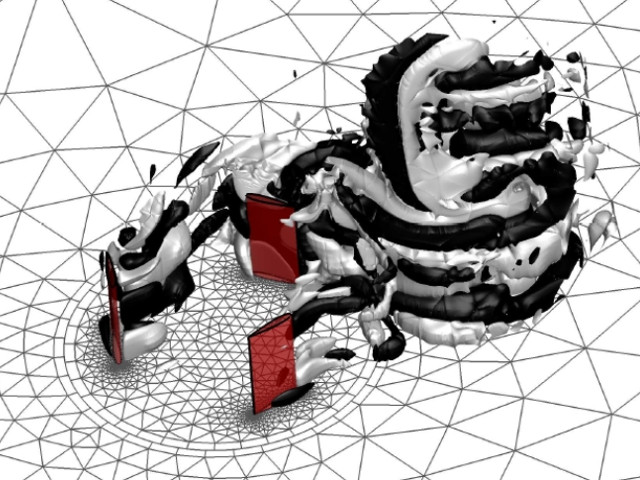June 22, 2022
Parallel Finite Volume/Discontinuous Galerkin implementation in FLUXO
Date and place:
- June, 22nd, 2022.
- ETSIAE UPM (Pl. del Cardenal Cisneros, 3, 28040 Madrid).
- E.T.S.I. Navales, Av. de la Memoria, 4, 28040 Madrid
- Five minutes walking from ETSIAE.
- Room: Aula 3.
- Zoom: https://upm.zoom.us/j/84325048108pwd=RWFVeFBTNEJ6V0lnRTIxRzA0QVFLdz09
Description:
In this short course, we review the subcell limiting techniques, the parallelization strategy, and the Adaptive Mesh Refinement (AMR) technology implemented in the open-source three-dimensional high-order discontinuous Galerkin code FLUXO. FLUXO implements the Discontinuous Galerkin Spectral Element Method (DGSEM) for non-linear conservative and non-conservative systems. The solver uses an oct-tree based AMR strategy based on the p4est library, is parallelized very efficiently, and scales up to hundreds of thousand cores. To guarantee robustness, FLUXO uses a subcell limiting strategy that consists in blending the high-order DGSEM with a robust Finite Volume (FV) method at the element-wise and subcell-wise level.
Contents:
- Subcell limiting strategies for the DGSEM
a) Blending the DGSEM with a compatible FV method
b) Element-wise vs. subell-wise limiting
c) Shock indicators and bounds-preserving discretizations - Parallel implementation in FLUXO
a) Two-step load balancing
b) MPI communication for FV/DGSEM methods - Adaptive Mesh Refinement (AMR) in FLUXO using the p4est library
a) Oct-tree based refinement for forests of oct-trees
b) Dynamic load balancing with p4est
c) Combining subcell-limiting strategies with AMR
About the lecturer:
Dr. Andrés M. Rueda-Ramiírez studied Mechanical Engineering at the National University of Colombia (Universidad Nacional de Colombia) and completed his Ph.D. studies in Aerospace Engineering at the Polytechnic University of Madrid (Universidad Politécnica de Madrid). During his Ph.D., AMRR studied and developed p-adaptation algorithms, implicit time-integration schemes, and multigrid solvers for high-order Discontinuous Galerkin Spectral Element Methods (DGSEM). AMRR is now a member of the Numerical Simulation Research Group at the University of Cologne, where he joined the development team of the DGSEM code FLUXO as one of its main developers. AMRR is currently working on subcell shock-capturing schemes for robust high-order Discontinuous Galerkin methods for the Navier-Stokes and the Magneto- Hydrodynamics equations.



